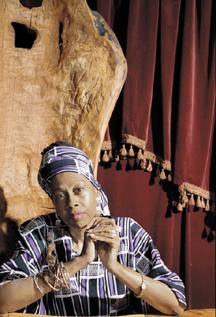 Dr. Dr.
Shirlene Holmes
Author/Playwright
Shirlene Holmes
is from Queens, New York. She holds a B.A. in English from York
College of the City University of New York, and M.F.A. in
Theatre/Playwriting and a doctorate in Speech from Southern
Illinois University at Carbondale. She is certified in a major
and minor in African American Studies, and teaches courses for
both GSU's Communication and African American Studies
Departments. Her areas of specialty are solo drama, creative
writing, and storytelling. She has received recognition for her
creative writing, performances, and work with students. Her
play, "A Lady and A Woman", was presented at Wichita
State University in the Spring of 1997. This play was also
presented by American Theatre Project in Washington, D.C., and
appears in Amazon All Start, a drama anthology edited by
Rosemary Keefe Curb, and published by Applause Books in 1996.
Professor Holmes' play, "Conversation with a Diva," had a
successful run at Actors Theatre of Washington in 1996. Her most
recent works include, "Tray and Deborah" at Neighborhood
Playhouse in May of 1998, and "Robert: Presenting Myself"
at GSU's Alumni Hall Theatre in February 1999.
Shirlene Holmes,
a prolific playwright and associate professor at Georgia State
University, is proof that Irish bards come in all forms. Her
play "Dark Irish" follows two women on their quest for
identity.
Longtime friend Kathleen Ferguson Frandsen
collaborated with Holmes on the piece, and the two will appear
on stage together in their celebration of connections and
self-discovery.
"For me personally, 'Dark Irish' comes from a running joke,"
said Holmes. "Back in the early '80s, I met a theater
professional named Kathleen Ferguson in New York. When we met,
she was intrigued by my name. 'That's an Irish name,' she said.
And I replied, 'Yes, I'm Dark Irish.' She said, 'I'm Dark Irish,
too.' It was a funny kind of joke because I'm African-American,
but she's dark because of her dark hair and dark eyes, which is
what is usually perceived as being 'Dark Irish.' I was making a
bit of a funny, and that funny has grown into a 20-year
friendship."
Identity is the key to the friendship that was
formed between Holmes and Ferguson. They've spent much of their
time together discussing Celtic identity and female identity.
"We both have this Irish ancestry,"
said Holmes. "Of course, mine's about three generations back,
with my great-grandmother, and hers is with her parents. But
we've been talking about Celtic lineage and how ironic it is. I
was raised African-American, but somehow the 'green,' if you
will, has always been around. I'm a black girl with two Irish
names, which makes me very interesting and very much American.
How do I deal with that? My name doesn't reflect who I really
am, or does it? I don't know."
This kind of discourse led the two women to
create a performance piece where two females talk about
identity, with the goal of opening a dialogue among audience
members. The Sunday matinee will be followed by a forum for
people to talk about anything that the play inspires in them.
Holmes said that she would like her audience to take away from
the play a celebration of diversity. "Kathleen and I would want
them to say, 'Hmm… ain't that something: Two different women
have many similarities!'"
"Dark Irish" is hardly the first play Holmes has had
performed. On the whole, she says, her work has been devoted to
the marginalized voice. She writes about lesbian mothers,
martyred wives, and often about those who are marginalized by
their sexual orientation. Often, says Holmes, she tries to write
in the tradition of African-American playwrights before her who
wanted to write about something serious.
"I write a lot about women," she said. "I write a lot
about African-Americans because we are so interesting, and
that's my perspective. It's how my ear is tuned. I write the
stories down that I hear, that I read about in the paper. I want
to write something that's going to speak to the community.
That's what my work does. That's what this project is about."
Source:
http://www.gsu.edu/~wwwvpr/featured%20scholar/holmes_scholar.htm
http://www.gsu.edu/~wwwuth/Shirlene%20Holmes.htm
|